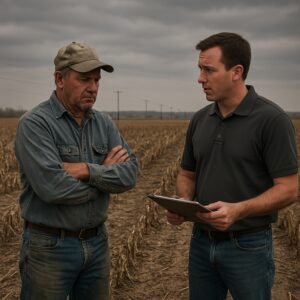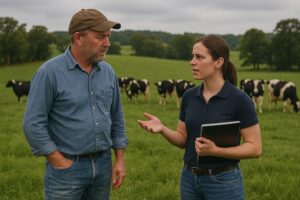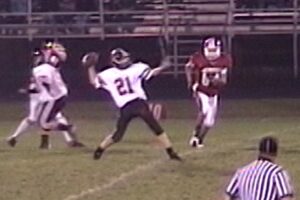The Ag economy is in tough shape for producers and Agribusiness!
What to do?
Rethink Upselling!
A word of warning about this article. Please read it entirely before passing judgment on what I am proposing. The reason I say that is because it challenges a long-standing belief that we should continuously upsell customers. I am not challenging the effectiveness of upselling. I simply want to point out the potential impact of continuously upselling. The decision on when and if you upsell a customer is a gray area that needs some skill and art applied to it, instead of an always or constant process.
Please do me a favor to test this theory out. At your next presentation. It doesn’t matter who the crowd is: farmers, agronomists, Ag retailers, livestock producers, insurance underwriters or your local church group. Ask this question, “How many people by a show of hands, likes or enjoys when you are upsold by a sales person?”
My guess is that you will get very few hands going up in your audience. You can ask it another way as many audiences simply won’t raise their hands. Ask, “How many of you are either frustrated or get a negative opinion of a company when they try to upsell you?”
I want to spend a few words on the difference between Selling, Upselling and Cross Selling. Normally I’m not a word semantic kind of person, but I think some explanation is needed for the purpose of this article. The lines between them are very thin.
Cross-Selling is all those activities that promote a product line besides the primary one the customer is using. For example, promoting your grain marketing programs to your agronomy customers. Cross selling is a great way to bring the resources that your company has to the customer’s attention. In addition, it builds cooperation between sales divisions if the cross product has different sales people. In agribusiness sales, it can also provide two sets of eyes and minds on a customer. There were multiple times when one sales person received valuable feedback for the other sales person calling on an account.
Upselling is all those activities that are designed to add products or services to a customer’s transaction. For example, “Do you need any fungicide today?” “Did you know we do custom spraying and we would be glad to add you to our program?”
Selling is all those activities that make sure I get what I need. If it sounds like a fine line between Selling and Upselling, that’s because it is. And the judgment is in the mind of the customer. For example, when I go to Home Depot with several pipes and wires that I removed from my home and I need help figuring out how to get my septic system running again, I want the person helping me to make sure I get all the parts I need. I don’t want this to be a 4-trip project (I know it’s not going to be one trip. Two for sure and slightly annoying when I have to make three trips, but hate to make four trips). So, I want help in knowing everything I need for the repair but I don’t want to be oversold on things I don’t need.
It happens every day in almost every interaction we have. It may sound like this:
“Would you like fries with that?”
“Would you like to supersize it for only 50 cents more?”
“Would you like the service agreement on that $9 flashlight? It’s a lifetime guarantee if it ever goes out on you, we’ll replace it!”
I dare you to go buy a brand-new car and not get upsold without saying “No” a minimum of 25 times. I know because I did and I actually counted them. Unfortunately, I only said no 24 times. The 25th broke through.
I once spent over an hour on the phone with the tech department of my internet/TV provider diagnosing an extremely frustrating internet issue. It turned out the boxes had to be reprogrammed. At the end of the call, my highly technical representative tried to upsell me on an upgraded package of channels. It was tough not unloading on the person at this point as it had taken an hour to work through the issue and I wasn’t in the mood to talk about spending more. If the upsell would have prevented my problem, then I would have listened, but it was just a blind stab at adding more expense to my account. It ended quickly.
So, why am I sounding negative on something that works? Why do we train our employees to Upsell when it seems no one wants to be Upsold? Why would we not Upsell when we know it can net an additional 10, 20 or even 30% more sales on each transaction?
Obviously Ag Sales is different than fast food sales based on the fact that most are with long term customers. We establish long term relationships that are based on trust. When I go to the drive thru window, I’m not there based on a long-term relationship. So, when the person tries to upsell me on meal choices, it doesn’t offend me as I know they are expected to say that to every customer. However, if I’m working with my financial advisor or my insurance agent, which is a long-term relationship and one that I hope is looking out for my best interest, then I am very resistant to upselling.
Our farmer customers are no different. These are long term relationships and they will be back next week or month to buy more products and services from us. Think about what you would do if every week you had to fend off a trusted advisor that tried to upsell you. Eventually, you become wary of it and change suppliers.
Several years ago, after learning about the increased per transaction sales by upselling, I got excited and launched a program with our order entry staff. These were the folks that answered the inbound calls and entered feed orders. We were going to set the feed world on fire when our customers called in their feed orders. I even implemented a small incentive plan, with charts and graphs to keep track of who sold more. Some embraced the opportunity and others not so much. Within the first weeks of implementing the process, we hit some major road blocks. First, it slowed down the number of calls per day a customer service person could handle. I hadn’t accounted for the increased time per call. More staff would be needed to make this program work. Otherwise, you get longer wait times on hold, more dropped calls and potentially lost orders. Secondly, the pace of the upselling process is different than the pace of entering a feed order. When a customer was calling in a feed order, they wanted to read off the laundry list of products, insure the order was entered accurately and confirm the load delivery date. Often, this was done while they were at their retail location, in between customers with speed & accuracy being critical. Slowing down to think about adding product lines or hearing detailed information on our products was not on their radar for that call. Needless to say, we received a lot of negative feedback from customers. Eventually, we went back to our previous process of simply informing callers about our current promotion as a courtesy to not miss out on them.
We all have a trust meter built into our brain with our relationships. I can tell you that the minute I feel I am being upsold and not just being sold, my trust meter with that person goes down and I feel I have to be on alert. If I don’t, I’m going home with a basket full of bedding plants when I went to Home Depot for a septic tank project.
The reverse is also true. If I feel like someone has spent the time to understand me and then recommended an easier or more cost efficient method, my trust goes up with them. It makes me feel like they are looking out for my best interest. Because of that, I am going to frequent that person’s business more often than the one that tries to upsell me. To me, this is important in all relationships but is absolutely crucial in long term relationships.
Again, I am not saying that upselling doesn’t work to increase per transaction dollars. That has been proven over and over. My issue is in the motive of the sales person, which is determined in the mind of the customer. When they sense you are not looking out for their best interest, you run the risk of losing them. This is tough to measure and predict, which is the purpose for this article and worth a discussion with your sales team. It’s a fine line as to when it is appropriate or not to upsell. Often, we never know we crossed the line until we lose the customer.
Keep that in mind as you approach your customer in the selling process.
Find out how I can work with you or your team, contact me directly at
More on Ag Sales Training, Ag Sales Coaching and Leading Ag Sales Teams, go to



